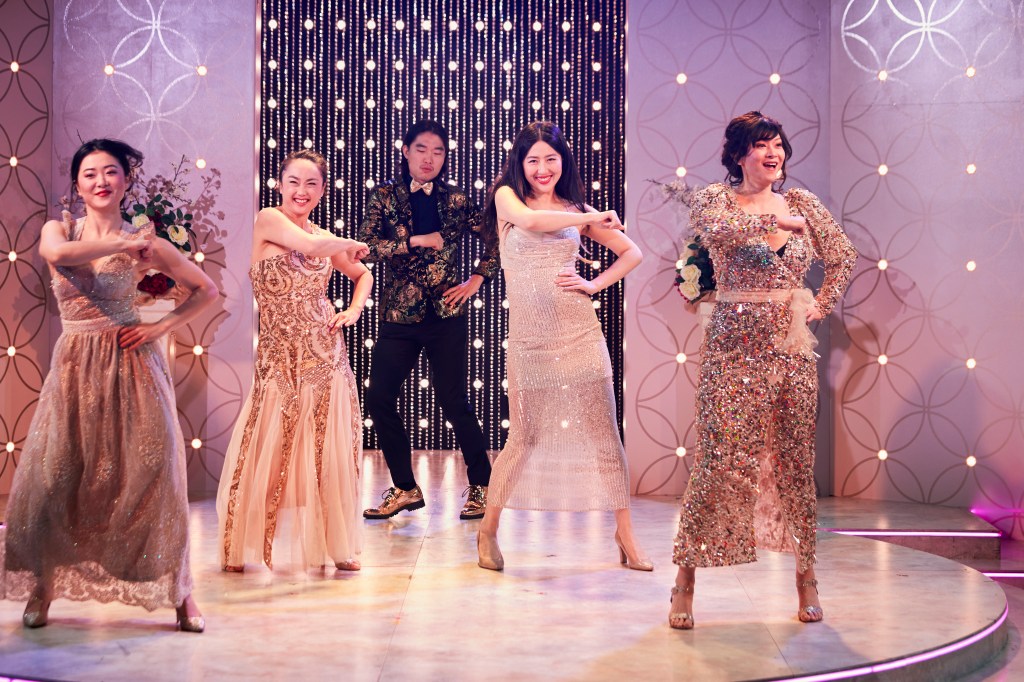Glitz, chintz and a smidge of the supernatural – it’s all here in Michelle Law’s swoony new production, Miss Peony. The play is an impassioned tribute to the fold of Asian Australian women in our lives, and imposes family, loss and sisterhood onto the divine Chinese feminine to ask, “Who of us actually knows what shape this can take?”
Stephanie Jack plays Lily, an insouciant 26-year-old who is disenchanted with her Chinese ideology-touting grandmother Adeline. She is an outlier by all traditional means: tattoo-appreciative, dyed hair, working at a bar to keep financially afloat. These details are thrown back in her face as taut disapproval from a scene-stealing Uncle and Auntie, who parrot Adeline’s own distaste for Lily’s presumed affection for the West.
On her deathbed, Adeline begs Lily to enter into the community beauty pageant, Miss Peony. Lily accepts on the condition that, upon winning, her grandmother must leave her alone. In the race to the crown, she is waylaid by a group of Chinese women we will come to understand first as stiff competition and, later, as lifelong friends.
The archetypes of the four Chinese Australian women are constrictive yet well-explored. We have “Fresh off the Boat” Marcy (Deborah Faye Lee alternating with Jing-Xuan Chan), whose ramrod-straight presentation later proves to be more flexible, Sabrina (Mabel Li), who is a loving yet hackneyed tribute to the Asian Baby Girl type of Sydney’s south and west, and Joy (Shirong Wu), a quirky Sapphist from Taipei.
These taglines are familiar and do not communicate anything new. We are drawn to these performances because we are fond of the tropes, but they run tangential to any deeper characterisation.
The Q&A portion of the pageant does well to remedy this: in mother tongues of Cantonese and Mandarin, the four women skewer these motifs in a smart “gotcha!” moment that reflects the expansiveness of the “mainland girl” tropes. The stereotypes are set up as a lure to shatter our scrutiny – grimly, we come to acknowledge that we are taking part in judgement ourselves. Against them, Lily shirks a little in the background. Her insecurity is a familiar anxiety complicated by the ongoing presence of her departed grandmother, yet her initial aversion to these women seems ungrounded in its hostility. When the plot drives the women closer to one another, this aspect disappears.
Gabby Chan‘s Adeline is the nodal heartbeat of the show. Her performance is whip-smart, densely layered with emotion yet weightless – she is a spectral presence, after all. The elements of the supernatural brought about by her character produce a whimsical, poltergeist feel. Whenever she hasn’t been summoned by Lily via a jade bracelet, the atmosphere flattens a little. The final scene in which she fan-dances (her talent of choice in her heyday) with her granddaughter is a release of tenderness, settling the audience for the emotional backend of the play when she finally departs.
Another riotous highlight: the performance of Mabel Li as Sabrina. The theatre rattles with laughs every time the character contorts herself into yet another hard-style sequence to rival any Defqon attendee.
Bravo also to Jonathan Hindmarsh and Keerthi Subramanyam’s eye for costumes, as well as the lighting crew who manage to bottle the Australasian essence with deceptive ease. In Act 2, the entire stage becomes repossessed by a pageant spirit: roving lights land on guests at whim, gowns strike the perfect chord between garish and chic in 2016, and a resplendent Charles Wu commandeers the stage as Zhen Hua, Miss Peony’s producer and host.
Some of the dialogue slips in its ability to impart meaning. Most of it in Act 2 happens in the backstage scenes, an aside from the pageantry hubbub. The interventions feel askew, the dialogue rushed through to get to the good bits – perhaps, like the audience, the characters are eager to return to the pageant world. Similarly, the plot skirts around the development of the romances, and the moments we do receive are in quick flits, with waxy, K-drama soapiness. Yet we still come to bat for the couplings, and for the unapologetically femme gaze that has the crowd howling in support.
It’s important to note that Opening Night wouldn’t have happened at all without the agility of the cast and crew. Praise should be given to all involved for dealing with increasingly challenging circumstances. After two COVID-foiled postponements and cast replacements, to produce an opening night with that much chutzpah should be celebrated.
Read: Exhibition review: Kayannie Denigan, Belconnen Arts Centre
Where Miss Peony shines is when it isn’t straining to make a point. The gleam of sisterhood when the girls unwind over hotpot, the syncopated musical medleys, even the riffing between grandmother and grandchild all relay real candour and joy. Because of those moments, Miss Peony flickers beautifully.
Miss Peony, by Michelle Law
Belvoir St Theatre, Sydney
Directed by Courtney Stewart
Set and Costume Designer: Jonathan Hindmarsh
Assistant Set and Costume Designer: Keerthi Subramanyam
Lighting Designer: Trent Suidgeest
Composer: Dr Nicholas Ng
Sound Designer: Julian Starr
Associate Sound Designer: Zac Saric
Assistant Director: Nicole Pingon
Choreographer: Kristina Chan
Singer Teacher: Sheena Crouch
Translators: Samantha Kwan, Dr Jing Han, Sylvia Xu
Vocal Coaches: Laura Farrell, Amy Hume
Fight and Intimacy Director: Nigel Poulton
Writing Dramaturg: Polly Rowe
Production Dramaturg: Carissa Licciardello
Community Engagement Coordinators: Ailsa Liu, Jessica Kejun Xu
Stage Manager: Gayda de Mesa
Assistant Stage Managers: Ayah Tayeh, Wun Zee
FOH Operator and Surtitle Programmer: Matthew James
Cast: Gabrielle Chan, Jing-Xuan Chan, Stephanie Jack, Deborah Faye Lee, Mabel Li, Shirong Wu, Charles Wu
Miss Peony will be performed in Sydney until 30 July before touring to Melbourne from 2-20 August, Canberra Theatre Centre from 23-26 August, Merrigong Theatre Company from 30 August to 2 September and Geelong Arts Centre from 6-9 September.
This review is published under the Amplify Collective, an initiative supported by The Walkley Foundation and made possible through funding from the Meta Australian News Fund.





